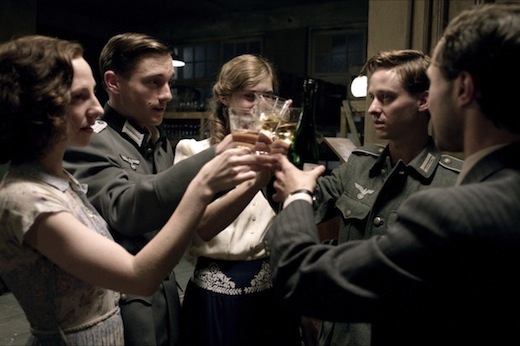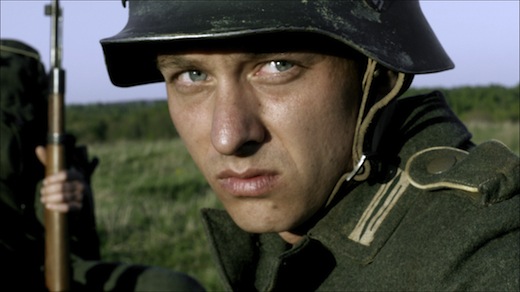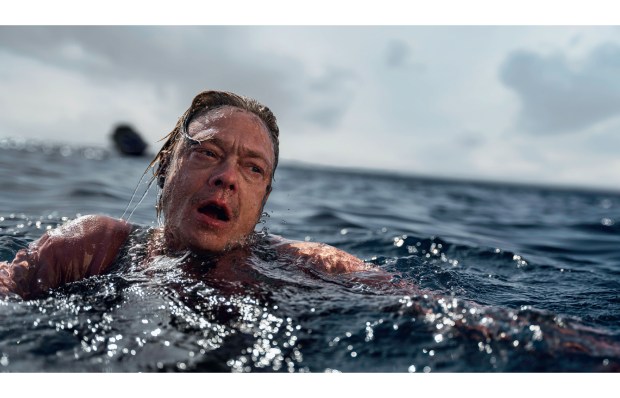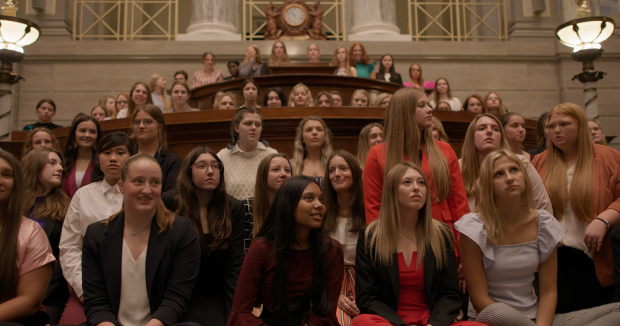I was so looking forward to Generation War (BBC2, Saturday) — a three-part drama series covering the second world war from the perspective of five young men and women on the German side. Any nation capable of producing the ME-109, the 88mm gun and the Tiger tank, not to mention Das Boot, really ought to have no problem making one of the most authentic, searingly honest war dramas ever to hit our screens…
How wrong I was. Consider a scene from this week’s opening episode involving Friedhelm — bookish, bolshie, anti-war younger brother of the more pugnacious and efficient Leutnant Wilhelm Winter. There they are on the Eastern Front, in the depths of winter, and Friedhelm is on guard duty at night in a foxhole petulantly smoking a fag — in calculated defiance of a comrade’s plea to stub it out for fear of alerting the enemy.

Now in the British army this would have been a serious offence but in the Wehrmacht — which executed an estimated 50,000 of its men during the war — quite possibly a capital one. Sure enough, a Russian aircraft spots the glow of Friedhelm’s cigarette and bombs the German position, perhaps — though it’s not clear — killing some of his comrades. Friedhelm gets off with an ad hoc punishment beating, tacitly endorsed by his brother. Seriously?
‘My problem is that I don’t know how far I can trust any of this,’ said the Fawn as we watched. Exactly. Generation War has done that very unGerman thing and bottled it: it has ducked frank and fearless authenticity in favour of face-saving, intellectually dishonest, politically correct melodrama that leaves its audience feeling frustrated, cheated and rudderless.
Even when it gets it right, it gets it wrong. Charlotte, who enlists as a nurse, takes on as her assistant Lilja, a very capable local Ukrainian ex-doctor who covers up for Charlotte’s mistakes. But their developing friendship is cut brutally short when Charlotte discovers Lilja is Jewish and that she may have been stealing morphine. She reports Lilja to the Gestapo — then regrets it when her betrayal is exposed.

Historically, this is plausible: war, Hitler and Nazism made the civilised people who produced Goethe, Schiller and Schubert do some very uncivilised things. Problem is, Charlotte has been so poorly established as a character at this point, we’ve no way of gauging whether she has acted this way a) because she is capricious, cruel and weird or b) — more likely, but we’re never shown this — because she is a product of her era. Worse still, you rather suspect the whole incident may be just a strained plot device that sets up a hanging thread to be implausibly resolved in a later episode.
This kind of cheesy hackwork diminishes the whole exercise. If you’re going to take on a subject as big and harrowing as the Eastern Front, you owe it to history not to cheat or pull your punches. Sure, we see the Wehrmacht committing atrocities — using Russian civilians as human minesweepers; shooting captured NKVD commissars in the back of head; rounding up Jews. But all too often, it’s as if the sensitivities of the German viewer are being salved with glib let-outs — in the case of the prisoner shooting, for example, by showing how much Wilhelm loathes having to do it; and in the case of the five heroes by making one of them a nice Jewish chap whom they all like. (Openly. In 1941. Right.)
What’s missing, though, from the series is I think — to use a cliché — the banality of evil. Unlike some cantish critics, I don’t think it’s a problem that wartime Germans are shown in a sympathetic light, even to the point of being portrayed as victims. Rather, what I find objectionable are the weasily ruses the drama has adopted to justify this semi-apologia.
Surely the key point about being a German in the second world war was this: regardless of whether you were good or bad, rampantly philo-Semitic or violently Nazi, you were chewed up by Hitler’s machine all the same. It was acquiesce or die. Often, acquiesce and die. No German serving on the Eastern Front, for example, would have been allowed the moral freedoms with which the scriptwriter has indulged the character of Friedhelm: he’s a 21st-century German parachuted into a period where he wouldn’t have survived more than a few seconds.
The brave and true thing for Generation War to have said is that within every one of us — given the right circumstances — lies the capacity to behave as the Germans did in the second world war. Very few of us would have taken a principled, Stauffenberg-style stand because most people just don’t. But even now, 70 years after the war’s end, the Germans are still so mired in guilt and self-hatred that they can’t admit it. If you believe, as I do, that failing to understand your past condemns you to repeat it, this is not an encouraging sign.
Got something to add? Join the discussion and comment below.
Get 10 issues for just $10
Subscribe to The Spectator Australia today for the next 10 magazine issues, plus full online access, for just $10.
You might disagree with half of it, but you’ll enjoy reading all of it. Try your first month for free, then just $2 a week for the remainder of your first year.














Comments
Don't miss out
Join the conversation with other Spectator Australia readers. Subscribe to leave a comment.
SUBSCRIBEAlready a subscriber? Log in